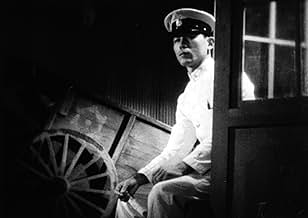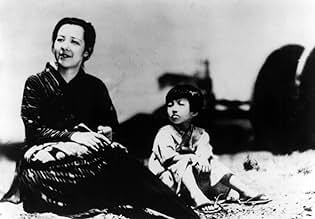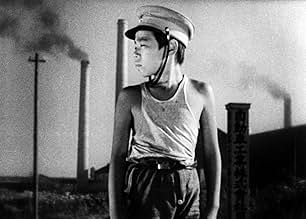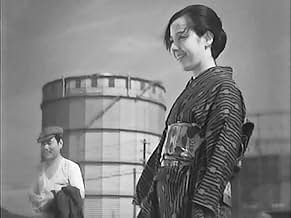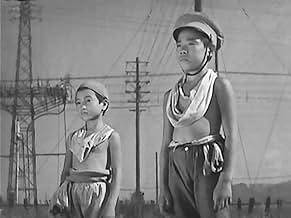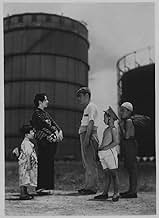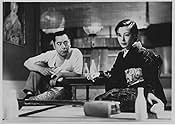Tôkyô no yado
- 1935
- 1 घं 19 मि
IMDb रेटिंग
7.4/10
1.8 हज़ार
आपकी रेटिंग
अपनी भाषा में प्लॉट जोड़ेंUnemployed Kihachi and his two sons struggle to make ends meet. But that doesn't keep Kihachi from wooing single mother Otaka.Unemployed Kihachi and his two sons struggle to make ends meet. But that doesn't keep Kihachi from wooing single mother Otaka.Unemployed Kihachi and his two sons struggle to make ends meet. But that doesn't keep Kihachi from wooing single mother Otaka.
- निर्देशक
- लेखक
- स्टार
फ़ीचर्ड समीक्षाएं
This early great work from The Master is a sobering melodrama honed squarely on a single unemployed, homeless father struggling to feed and shelter his two sons. Ozu does a fine job capturing the dynamic between the two boys by themselves and with their father, but the film really gets interesting when two women enter the story: a young single mother, also homeless, and an old friend who finds the father a job. The maudlin climax seems to anticipate Ford's GRAPES OF WRATH and DeSican melodrama -- though in the wrong ways -- but prior to that Ozu comes up with an quirky expressionist sequence to reflect the father's unraveling moral state.
Ozu's final surviving silent film (College is a Nice Place seems to be both silent and lost), An Inn in Tokyo feels more like a return to socially conscious filmmaking from the Japanese director, more bluntly dealing with poverty as a central motif than he had in A Story of Floating Weeds where the poverty felt more situational and tied to character. Ultimately, the film ends up working very well, but An Inn in Tokyo kind of feels like Ozu taking a step backwards, trying to be timely rather than pursuing his own stories.
The second movie featuring the character Kihachi (Takeshi Sakamoto) who first appeared in Ozu's Passing Fancy, the story is about the single dad trying to find work while penniless and in charge of his two boys, Zenko (Tokkan Kozo) and Masako (Takayuki Suematsu). He can work a lathe, but no one will hire him, and the family of three have to choose whether to sleep in a field and eat or to sleep in the titular inn and not eat every night in order to save what little money they have. When Zenko spends a chunk of their remaining cash on a hat for himself, their dire situation is made all the worse. And Kihachi can't get mad. They're just kids. It's not their fault. He's responsible for them, and it's his fault that they're having to choose between food and a roof over their heads, with dwindling resources every day.
They're joined by Otaka (Yoshiko Okada) and her daughter Kimiko (Kazuko Ojima), another parent/child impoverished pair who wander the fields of the industrial area outside of Tokyo. Kihachi's salvation, though, comes from an old friend, Otsune (Choko Iida), who owns a small tea shop and can provide him and his boys (and quickly thereafter Otaka and her girl) with a place to sleep and some food.
What's interesting about the character journey here is that it's a realization on the part of Kihachi that...he shouldn't be a father. He can't take care of his own children, and he makes all of the wrong decisions to the point where he decides that his kids are better off being raised by someone else. It's the sort of realization that hurts once it comes, but come it does.
The path is around Otaka disappearing for a while when she gets a job, Kihachi taking it quite badly, and Kihachi, gotten a job through Otsune's influence, deciding that he needs to take drastic measures to help Otaka when she reveals that Kimiko is having health problems.
His string of decisions leads to that quiet ending where Kihachi has to reflect on what he's become, looking mournfully at people he's betraying to do what he thinks is right, and making his big choice about his family's future. That Kihachi has been so well-drawn, the situation so well established, and the supporting characters so well integrated that there's real emotional weight to those final moments. It's an accomplished ending that actually does move me.
I just feel like the opening is kind of heavy-handed with the portrait of poverty. Which is a contrast to A Story of Floating Weeds where the poverty felt so easily integrated, even while the portrait of the acting troupe's poverty was so instrumental to the drama of the story working out. Maybe it's simply a factor of how long Ozu wallows in the poverty at the beginning of An Inn in Tokyo. There's little else for the first twenty minutes or so. There are far fewer characters and far fewer things for the characters we do have to do (the deal with the hat essentially gets repeated when Zenko and Masako argue over carrying a bag, just leaving it on the road and walking away as their solution).
So, the opening is drawn out and slightly repetitive, but at the halfway point, Ozu brings things into the proper gear and moves along at the right pace to get us to the emotional climax. It's almost like he didn't quite have enough story idea and his cowriters (Masao Arata and Tadao Ikeda) didn't know how to fill that opening act with enough material. Still, the overall package has the right kind of punch, a very good way for Ozu to say goodbye to the silent period (again, minus College is a Nice Place).
Still, he's been aching for the sound period for a while. Characters really need to speak. It's time.
The second movie featuring the character Kihachi (Takeshi Sakamoto) who first appeared in Ozu's Passing Fancy, the story is about the single dad trying to find work while penniless and in charge of his two boys, Zenko (Tokkan Kozo) and Masako (Takayuki Suematsu). He can work a lathe, but no one will hire him, and the family of three have to choose whether to sleep in a field and eat or to sleep in the titular inn and not eat every night in order to save what little money they have. When Zenko spends a chunk of their remaining cash on a hat for himself, their dire situation is made all the worse. And Kihachi can't get mad. They're just kids. It's not their fault. He's responsible for them, and it's his fault that they're having to choose between food and a roof over their heads, with dwindling resources every day.
They're joined by Otaka (Yoshiko Okada) and her daughter Kimiko (Kazuko Ojima), another parent/child impoverished pair who wander the fields of the industrial area outside of Tokyo. Kihachi's salvation, though, comes from an old friend, Otsune (Choko Iida), who owns a small tea shop and can provide him and his boys (and quickly thereafter Otaka and her girl) with a place to sleep and some food.
What's interesting about the character journey here is that it's a realization on the part of Kihachi that...he shouldn't be a father. He can't take care of his own children, and he makes all of the wrong decisions to the point where he decides that his kids are better off being raised by someone else. It's the sort of realization that hurts once it comes, but come it does.
The path is around Otaka disappearing for a while when she gets a job, Kihachi taking it quite badly, and Kihachi, gotten a job through Otsune's influence, deciding that he needs to take drastic measures to help Otaka when she reveals that Kimiko is having health problems.
His string of decisions leads to that quiet ending where Kihachi has to reflect on what he's become, looking mournfully at people he's betraying to do what he thinks is right, and making his big choice about his family's future. That Kihachi has been so well-drawn, the situation so well established, and the supporting characters so well integrated that there's real emotional weight to those final moments. It's an accomplished ending that actually does move me.
I just feel like the opening is kind of heavy-handed with the portrait of poverty. Which is a contrast to A Story of Floating Weeds where the poverty felt so easily integrated, even while the portrait of the acting troupe's poverty was so instrumental to the drama of the story working out. Maybe it's simply a factor of how long Ozu wallows in the poverty at the beginning of An Inn in Tokyo. There's little else for the first twenty minutes or so. There are far fewer characters and far fewer things for the characters we do have to do (the deal with the hat essentially gets repeated when Zenko and Masako argue over carrying a bag, just leaving it on the road and walking away as their solution).
So, the opening is drawn out and slightly repetitive, but at the halfway point, Ozu brings things into the proper gear and moves along at the right pace to get us to the emotional climax. It's almost like he didn't quite have enough story idea and his cowriters (Masao Arata and Tadao Ikeda) didn't know how to fill that opening act with enough material. Still, the overall package has the right kind of punch, a very good way for Ozu to say goodbye to the silent period (again, minus College is a Nice Place).
Still, he's been aching for the sound period for a while. Characters really need to speak. It's time.
10mgmax
The richly moving story of a hard-luck father and his two children, this masterpiece of unadorned realism may remind you more of Italian films like Shoeshine than Ozu's more staid work of the 50s. (The inspiration was probably Vidor's The Crowd, and a comparison with that masterpiece is by no means out of order.)
*** I SUMMERIZE THE GENERAL PLOT OF THE FILM AT LENGTH. NARRATIVE SPOILERS AHEAD ***
A man and two boys are seen walking along one of the many lonesome, dusty roads that exist inside the world of Ozu. They are shot from a low angle and against the monumental sky. They are like lone sailors lost at sea.
There is no work for the father (Kihachi), despite the numerous, booming factories, and so there is no food for the young, scrawny boys (Zenko and Masako). They are doomed from the start; trapped in a gray malaise and where luxury exists just out of reach.
Beautiful things happen in the in-between moments of Ozu's films. In his silent films, they usually happen in a field. There is an early scene in this film, where the boys and their father pantomime a rich feast full of fluffy, white rice and endless sake. This short reprieve from hopelessness is heaven for them, and we see them smile for the first time in the film's opening twenty minutes.
But the scene is much more beautiful still, because of the sorrowful, scoring of strings that accompany the images. Ozu may let his characters forget, for a while, their troubles, but he certainly doesn't intend for us to. This dichotomy between what we feel and what the characters feel creates an arresting sense of poignancy. Their temporary enjoyment is not meant for us.
The trio eventually catches a break, one presented to them by an old friend of Kihachi. She is a woman named Otsune with whom he used to kick up trouble. She is now reformed. She is running a restaurant and is able to dig up some work for Kihachi. The next ten days, he says, are the happiest of his life.
Things are complicated by Otaka, an impoverished single mother whose child has grown ill with dysentery. The two, fragmented families have met along their shared but separate paths of economic struggle. Kihachi has grown fond of the mother and the boys enjoy the company of her cherubic daughter. In an effort to repair his broken family, and because he has fallen in love, Kihuchi steals a large sum of money from a local officer to pay for the child's treatment, before turning himself in.
An Inn in Tokyo plays as a series of isolated moments in a bitter life full of cruel ironies. Even so, Ozu imbues a strong poetic beauty (in terms of how he frames this misery) within his social realism that allows the film to effectively absorb the viewer. The film succeeds in not simply drowning in its sea of anguish, but instead by providing a lens through which to see the unexpected moments of joy that go along with it.
A man and two boys are seen walking along one of the many lonesome, dusty roads that exist inside the world of Ozu. They are shot from a low angle and against the monumental sky. They are like lone sailors lost at sea.
There is no work for the father (Kihachi), despite the numerous, booming factories, and so there is no food for the young, scrawny boys (Zenko and Masako). They are doomed from the start; trapped in a gray malaise and where luxury exists just out of reach.
Beautiful things happen in the in-between moments of Ozu's films. In his silent films, they usually happen in a field. There is an early scene in this film, where the boys and their father pantomime a rich feast full of fluffy, white rice and endless sake. This short reprieve from hopelessness is heaven for them, and we see them smile for the first time in the film's opening twenty minutes.
But the scene is much more beautiful still, because of the sorrowful, scoring of strings that accompany the images. Ozu may let his characters forget, for a while, their troubles, but he certainly doesn't intend for us to. This dichotomy between what we feel and what the characters feel creates an arresting sense of poignancy. Their temporary enjoyment is not meant for us.
The trio eventually catches a break, one presented to them by an old friend of Kihachi. She is a woman named Otsune with whom he used to kick up trouble. She is now reformed. She is running a restaurant and is able to dig up some work for Kihachi. The next ten days, he says, are the happiest of his life.
Things are complicated by Otaka, an impoverished single mother whose child has grown ill with dysentery. The two, fragmented families have met along their shared but separate paths of economic struggle. Kihachi has grown fond of the mother and the boys enjoy the company of her cherubic daughter. In an effort to repair his broken family, and because he has fallen in love, Kihuchi steals a large sum of money from a local officer to pay for the child's treatment, before turning himself in.
An Inn in Tokyo plays as a series of isolated moments in a bitter life full of cruel ironies. Even so, Ozu imbues a strong poetic beauty (in terms of how he frames this misery) within his social realism that allows the film to effectively absorb the viewer. The film succeeds in not simply drowning in its sea of anguish, but instead by providing a lens through which to see the unexpected moments of joy that go along with it.
A classic exercise for one with writers block is to pick a location, then build a story around it. I haven't read anything to suggest Ozu was suffering from writers block at the time, but that is the way much of 'An Inn in Tokyo' plays out, with a good two thirds of the story occurring in the empty fields outside factories. The fields are bare bar for unkempt shin high grass, and old bits of machinery, mostly performing the role of seats, strewn about, with towers and cranes and billowing smoke always looming in the background - a symbol of dirty prosperity amongst the otherwise barren landscape. And who does Ozu put in these fields? Why a father and two sons of course, which will come as no surprise to anyone familiar with his other silent work - it seems to be his special subject. The story plays out like a groundhog day - the man and his sons have no money, and wander the fields from factory to factory looking for work, filling their time between rejections by sitting in the fields and having the same conversations as the previous day - different variations of, 'Are you hungry?" What little money they do have, his sons blow on buying a nice hat they saw another boy with, before losing their fathers rucksack. It all looks nigh on hopeless before a chance encounter with a past friend at an inn in Tokyo finds him some work, and offers a floor to sleep on. They befriend a fellow jobless woman and her daughter, unselfishly sharing food with them, before the story takes a dramatic and heartbreaking (albeit not unpredictable) turn when the daughter gets sick, and the question of all adults are begged - what are you prepared to do for the sake of your children, and what is the cost?
It is a typically humble, family driven film from Ozu, where all characters are flawed, yet viewed with a sympathetic eye for the difficulties they face. Such is the down to Earth quality of the film (even Ozu's camera placements are 'down to Earth') that 'entertainment' hardly feels like an apt description, which is both a gift and a disservice. A gift in that it doesn't feel too showy or trivial, and a disservice in that it is a touch lackluster. Ozu's best silent work ('I Was Born But', 'Passing Fancy') contain similar themes in the same style, yet manage to entertain thanks to humour and charm. Those moments are not totally absent here, just more subdued. While the low key repetitiveness of the first act will threaten to turn some viewers away, it ultimately gives the drama of the final act greater impact, and the film is better for it. It is definitely one for those who like their films depressing, but makes a fine entry in the genre, and is preferable to Ozu's earlier, melodramatic silent 'A Story of Floating Weeds'. 6.5/10
It is a typically humble, family driven film from Ozu, where all characters are flawed, yet viewed with a sympathetic eye for the difficulties they face. Such is the down to Earth quality of the film (even Ozu's camera placements are 'down to Earth') that 'entertainment' hardly feels like an apt description, which is both a gift and a disservice. A gift in that it doesn't feel too showy or trivial, and a disservice in that it is a touch lackluster. Ozu's best silent work ('I Was Born But', 'Passing Fancy') contain similar themes in the same style, yet manage to entertain thanks to humour and charm. Those moments are not totally absent here, just more subdued. While the low key repetitiveness of the first act will threaten to turn some viewers away, it ultimately gives the drama of the final act greater impact, and the film is better for it. It is definitely one for those who like their films depressing, but makes a fine entry in the genre, and is preferable to Ozu's earlier, melodramatic silent 'A Story of Floating Weeds'. 6.5/10
क्या आपको पता है
- ट्रिवियाThe credits indicate that the script was based on an original work by a foreign writer with a name that sounds like "Winzart Monet", but it is actually a gag name, derived from "without money".
- कनेक्शनFeatured in A Story of Children and Film (2013)
टॉप पसंद
रेटिंग देने के लिए साइन-इन करें और वैयक्तिकृत सुझावों के लिए वॉचलिस्ट करें
विवरण
- रिलीज़ की तारीख़
- कंट्री ऑफ़ ओरिजिन
- भाषा
- इस रूप में भी जाना जाता है
- An Inn in Tokyo
- उत्पादन कंपनी
- IMDbPro पर और कंपनी क्रेडिट देखें
- चलने की अवधि1 घंटा 19 मिनट
- रंग
- ध्वनि मिश्रण
- पक्ष अनुपात
- 1.37 : 1
इस पेज में योगदान दें
किसी बदलाव का सुझाव दें या अनुपलब्ध कॉन्टेंट जोड़ें


